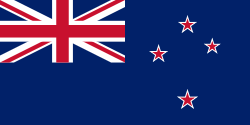| New Zealand at the 1930 British Empire Games | |
|---|---|
 | |
| CGF code | NZL |
| CGA | New Zealand Olympic and British Empire Games Association |
| Website | www |
| in Hamilton, Ontario, Canada | |
| Competitors | 22 |
| Flag bearers | Opening: Stan Lay Closing: |
| Officials | 3 |
| Medals Ranked 4th |
|
| British Empire Games appearances | |
New Zealand at the 1930 British Empire Games was represented by a team of 22 competitors and three officials. Team selection for the Games in Hamilton, Ontario, Canada, was the responsibility of the New Zealand Olympic and British Empire Games Association. New Zealand's flagbearer at the opening ceremony was Stan Lay.
Contents
- Medal tables
- Competitors
- Athletics
- Track
- Field
- Diving
- Lawn bowls
- Rowing
- Swimming
- Officials
- See also
- References
- External links
These were the first British Empire Games, although in 1911 there was an Empire sports competition at the Festival of Empire in London. New Zealand has competed in every games since.